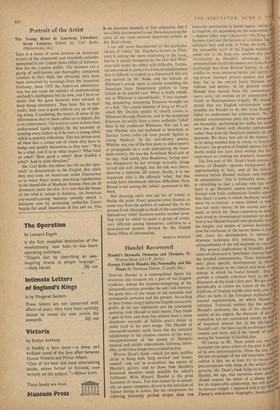Portrait of the Artist
The Young Rebel in American Literature: Seven Lectures. Edited by Carl Bode. (Heinemann, 16s.) THIS is a series of seven lectures on American writers of the nineteenth and twentieth centuries sponsored by the United States Office of Informa- tion for the London public. The lecturers are a group of well-known and thoroughly competent scholars in their field, but obviously they have been restrained by warnings from the American Embassy. Since 1952 the American administra- tion has not made the mistake of overestimating anybody's intelligence but its own, and I have no doubt that the guest lecturers were advised to keep things elementary. They have. But to their credit, their tone is good without any air of talk- ing down. Considering the nature of some of the information they've been called on to impart, this is an achievement. The lecturers seem to have been embarrassed (quite rightly) by the necessity of treating every author as if he were a young rebel, which is patently ridiculous. This has driven most of them into a corner out of which they have to hedge and qualify themselves as they may: Was he a rebel, and if so in what respect? What kind of rebel? How good a rebel? How fruitful a rebel? And in what direction?'
Mr. Carl Bode, the editor, has hit on this 'gim- mick' to demonstrate to the English that while they may look on Americans under Eisenhower as so many fleecy lambs, practising togetherness in the sheepfolds of Madison Avenue, they are all dissenters under the skin. It is true that the image of the rebel is valued in America. An American toy-manufacturing business recently struck a lucrative vein by producing rabbit-fur Castro beards for small Americans of five and six. This
Is an innocent example of free enterprise, but I am a little disconcerted to see them decorating the chins of our most eminent American writers in Mr. Bode's book.
I am still more disconcerted by the particular choice of 'rebels.' Mr. Daiches's lecture on Whit- man is among the more interesting in the book, but he is clearly hampered by the fact that Whit- man falls under the rubric with difficulty. Techni- cal innovation in poetry is a form of rebelliousness that is difficult to exploit in a framework like the one devised by Mr. Bode, and the latitude of Whitman's sexual views is clearly something the American State Department prefers to keep locked in its attachd case. What is really rebelli- ous in Whitman is second-hand : 'I was simmer- ing, simmering, simmering. Emerson brought me to a boil.' The cosmic identity of Song of Myself, which Mr. Daiches speaks of, clearly comes to Whitman through Emerson, and in the temperate Emerson we really have a more authentic 'rebel' than in the exuberant Whitman. Nor can I see why Whittier was not preferred to Steinbeck or Sinclair Lewis (who cut even poorer figures as young Shelleys). In his anti-slavery poems, Whittier was one of the first poets to utilise poetry as propaganda on a scale anticipating the twen- tieth century. He was the Archibald MacLeish of his day. And surely Ann Bradstreet, facing puri- tan disapproval by her writings (actually, things turned out well enough, but the risk was there), deserves a mention. Of course, finally, it is the expatriate who is the ultimate 'rebel,' but this would have introduced obvious difficulties. Ezra Pound is not among the 'rebels' sponsored in this book.
But choosing one's own pet list of 'rebels' is beside the point. Every genuine artist dissents in some way from the pattern of national life. In the present book (through no fault of the contributors themselves) 'rebel' becomes merely another level- ling word by which to make a group of artists, very different among themselves, conform to a preconceived pattern devised by the United States Office of information.
MARIUS BEWLEY






































 Previous page
Previous page